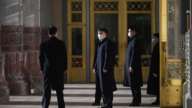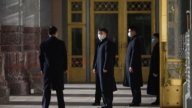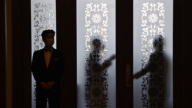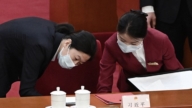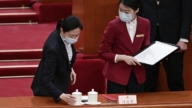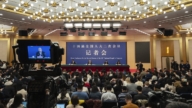【新唐人2013年03月16日讯】星期四,两千多名中国人大代表毫无悬念的,推举习近平为中共的国家主席和军委主席。但是习近平没有全票当选,有一票反对和三票弃权。大陆学者认为,没有竞争的选举,投票比例高低没有任何意义。也有学者对投反对票和弃权者表示敬意。
中共人大会议选举新一届领导人,15号正式确立所谓“习李体制”。习近平以2,952张赞成票、1张反对票和3票弃权当选国家主席,成为继毛泽东、刘少奇、李先念、杨尚昆、江泽民、胡锦涛后,中共政权下的第七位国家主席。习近平得票率接近99.9%。
同时,习近平以2955票,所谓“高票当选”国家中央军委会主席。
而由习近平提名的国务院总理人选李克强,以2940票赞成、3票反对、6票弃权通过,“当选”国务院总理,得票率达99.69%。
“中国人民大学”政治学教授张鸣表示,那些在中共一言堂上投反对票的人,很需要勇气。
中国人民大学政治学教授 张鸣:“那都是代表中,非常难得有个性的人、有主张的人。他们投反对票实际上有一定压力的,所以要真投反对票那都很不容易,我相信。”
“北京理工大学”法学院教授徐昕也对投反对票的人大代表,表示钦佩之意。
徐昕:“ 我只想说一句话,我希望知道是谁投的这些票。”
不过,“中国社科院近代史研究所”研究员兼研究生院教授马勇表示,这种“高票当选”并不真实,因为不存在任何竞争对手。
中国社科院近代史研究员兼教授马勇:“我总觉得,一个真正的竞选,还是非常重要的。没有竞争的选举,可能就不能说是真正的选举。这个时候你讲的票数了,什么多少啦,好像得票比例高,那都没有意义的。一个竞争的机制,比如有两个人去竞争,那么一个人得到52%,51%,那他就胜出。那一比一的竞争的话,你得到99.99%和你得到51%,他没有什么区别的啦。”
习近平获得反对票一票和三票弃权,虽然吸人眼球,但是胡锦涛和江泽民曾经获得更多反对票。媒体回顾2003年胡锦涛当选国家主席,获得4张反对票,3张弃权票。而1998年,江泽民当选国家主席,获得了36张反对票,29张弃权票。
另外,当选国家副主席的中共政治局改革派成员李源潮,是中共政治局委员,不在七常委之中。李源潮仍以2,839张赞成票、80张反对票、37张弃权票,当选国家副主席。
而10年前,被视为前领导人江泽民亲信的曾庆红,当选国家副主席时,却有177票反对票、和190张弃权票。
徐昕:“如果哪一天有10%,20%的反对票,那才有区别。”
张鸣还表示,中共“两会”的投票,候选人得票多少,代表不了民意。
张鸣:“多少这个东西。因为人大代表进去的都是官员,多是国企老总、大老板。他们本身也不代表民意,只能说他们代表官意。投反对票多一点,不是人缘不好,是官缘不好。反对票少的就是官缘比较好。”
马勇表示,他对于中共新领导人习近平和李克强没有太多期待,但是他相信,中国肯定会慢慢走向民主宪政的路。马勇说,谁不走,肯定就是背离了这个世界潮流。
采访编辑/秦雪 后制/钟元
Xi is CCP’ Leader with 1 opposition and 3 abstaining Votes
Over 2,000 delegates at the National People’s Congress
elected Xi Jinping as the Chinese Communist Party’s (CCP) new leader and commander-in-chief this Thursday.
Xi was not elected by a unanimous vote, as there were
three abstaining and one ballot against him.
Mainland scholars remarked that the vote result
has little meaning as there is no rivalry in the election.
On the other hand, other scholars paid tributes
to those who made abstaining and opposing votes.
CCP’s National People’s Congress officially established
the Xi-Li leadership on March 15, through voting.
Xi Jinping was “elected” to be CCP’s general secretary
with 2952 votes in favor, 3 abstaining and 1 opposition.
He is CCP’s 7th leader, following Mao Zedong, Liu Shaoqi,
Li Xiannian, Yang Shangkun, Jiang Zemin and Hu Jintao.
Xi almost got 99.9% of the votes.
Xi was also elected as the national supreme
commander-in-chief with 2955 votes.
Li Keqiang, nominated by Xi as a candidate for premier,
was “elected” with 2940 votes.
Li received 3 opposition’ and 6 abstaining’ votes,
but won with 99.69% of all votes.
Professor of political science at Renmin University of China,
Zhang Ming remarked, it requires much courage to make an opposing vote under the CCP’s dictatorship regime.
Zhang Ming, Professor at Renmin University of China:
”Among all the delegates, those who voted against Xi or Li are the rare ones with personal characters and opinions.
Definitely there is some pressure over them for doing that.
Thus I think it is not easy to really make an opposing vote.”
Xu Xin, a law professor at Beijing’s Institute of Technology,
also paid tribute to those who made opposing votes.
Xu Xin: ”I just want to say, I want to know who they are.”
Chinese Academy of Social Sciences’ researcher Ma Yong
commented on the issue too.
Ma said, Xi being almost unanimously elected is not real
because he has no rival in the election.
Ma Yong, Chinese Academy of Social Sciences’ researcher:
”I always believe that real competition is very important in an election.
An election cannot be a real one without rivalry.
In such a case the result has little meaning
no matter how many votes you receive.
For example, in a system with competition
you can have two candidates running for one position.
If one of them receives 52% or 51% of the votes,
he will win the election.
But if you are the only candidate, there is little difference
between winning 99.99% and 51% of the votes.”
Although Xi’s receiving 1 opposition and 3 abstaining votes
in this election might seem striking, this is not a precedent.
In fact Hu Jintao and Jiang Zemin had received
more opposing votes in the past.
Some media reviewed that in 2003, Hu Jintao was elected
as CCP’s secretary with 4 opposing and 3 abstaining votes.
In 1998, Jiang Zemin received even more –
36 opposing and 29 abstaining votes.
In addition, Li Yuanchao, a key member of the CCP’s
reformist group, was elected as vice secretary, although he is not a standing committee’ member of the politburo.
There were 2839 votes supporting Li,
while 80 made opposing votes and 37 abstained.
Jiang Zemin’ confidant Zeng Qinghong became 10 years ago,
vice-secretary with 177 opposing and 190 abstaining votes.
Xu Xin: ”If someday there are 10% or 20% votes against
the candidate, then real changes must have taken place.”
Zhang Ming further noted, the votes a candidate receives
during CCP’s two meetings can’t reflect Chinese people will.
Zhang Ming: ”The number means little in and of itself
as most delegates are officials, heads of state-owned companies or big bosses.
Their votes reflect the will of the regime
rather than that of ordinary Chinese people.
More opposing votes probably result from bad relationship
with officials, rather than less popularity among the people.
Correspondingly, fewer opposing votes only show
that you are more popular among the officials.”
Ma Yong does not have much expectation
for Xi Jinping and Li Keqiang as the CCP’s new leaders.
However, he believes that China will gradually realize
what is a real democratic constitutionalism.
Ma Yong said, anyone who rejects democratization
is trying to go against the global trend in the era.


